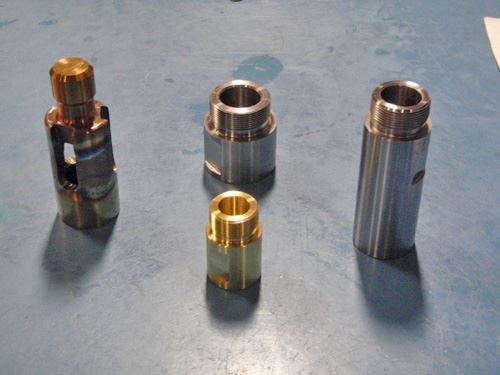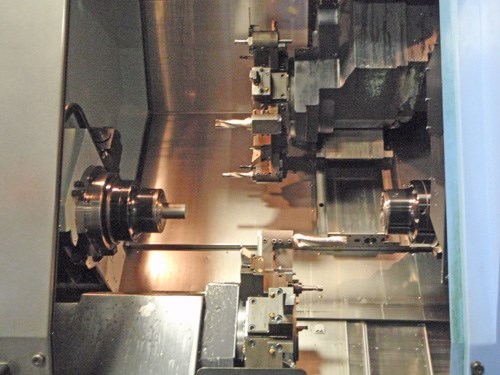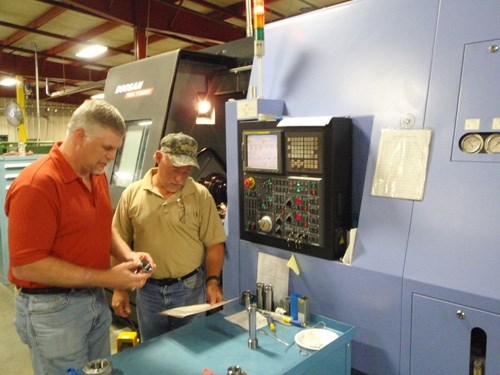Twin-Spindle, Twin-Turret Turning Center Boosts Pump Manufacturer’s Productivity
Precision Downhole Pumps, a division of Cameron International, in Iola, Kansas. is using two twin-spindle, twin-turret turning centers with Y-axis milling capability to finish complex jobs in one setup instead of the six formerly required. The new machines, from Doosan Infracore, have reduced manufacturing time by more than 30 percent.
Share




In the economic environment facing today’s business, gains in productivity can result in lower production costs and reduced labor intensity. So it is for Precision Downhole Pumps, a division of Cameron International, in Iola, Kansas.
Precision manufactures and markets a complete line of subsurface sucker rod pumps and other products for the oil industry worldwide, including the United States, Romania, Russia, Indonesia, South America and Canada. To help expedite customer orders, it has sixteen warehouses strategically located throughout the United States.
The company’s modern, 60,000-square-foot facility features an extensive array of lathes and mills used to manufacture the components of a Precision pump. To go from barstock to finished part, many of these components require as many as six different operations. Until recently, each of these steps required the machine operator to stop the operation and change tooling or reposition the part before proceeding to the next step.
Today, that has changed. Through the addition of twin-spindle, twin-turret turning centers with Y-axis milling capability from Doosan Infracore (West Caldwell, New Jersey), the six separate manufacturing operations are reduced to one continuous operation. The multitasking machines—a Puma TT1800SY and a Puma TT2500SY—have created reductions of more than 30 percent in manufacturing time. According to the Precision management team, the company has seen significant quality and speed improvements, the result largely of not having to handle the part six different times.
“The Doosan equipment has reduced our labor costs, reduced handling time and improved the quality of our finished products. It has been amazing to see what this equipment has meant to our productivity,” says Mark Burris, Precision’s business development specialist.
Operations Manager Randy Misenhelter adds, “This equipment has improved our ability to deliver to our customers in a timely manner. It used to take 3 days to make a part. Now we get an order and can ship the part the next day. These two machines have taken over the work of 10 lathes and mills, and we haven’t even pushed the machines yet. We’ll be able to increase the speed of production even further as time goes on.”
According to Mr. Misenhelter, Precision operators set up the equipment and the inventory of barstock, confirm the programming for the specific components and then let the machines do their work. What goes in as raw material comes out as finished, precisely manufactured parts, he says.
Precision reports strong growth in both their domestic and international business since Mr. Burris’s purchase of the company in 1990. Today the company has sales five times their 2004 numbers. The company says that the efficiencies created by the multitasking machines have recently allowed it to become competitive in China, where oil production is a fast growing segment of its economy.
Mr. Burris notes that the success of the business can be traced to its commitment to quality products, delivered on time and backed by “knock-out” customer service.
Related Content
-
How to Determine the Currently Active Work Offset Number
Determining the currently active work offset number is practical when the program zero point is changing between workpieces in a production run.
-
High RPM Spindles: 5 Advantages for 5-axis CNC Machines
Explore five crucial ways equipping 5-axis CNC machines with Air Turbine Spindles® can achieve the speeds necessary to overcome manufacturing challenges.
-
The Future of High Feed Milling in Modern Manufacturing
Achieve higher metal removal rates and enhanced predictability with ISCAR’s advanced high-feed milling tools — optimized for today’s competitive global market.



























